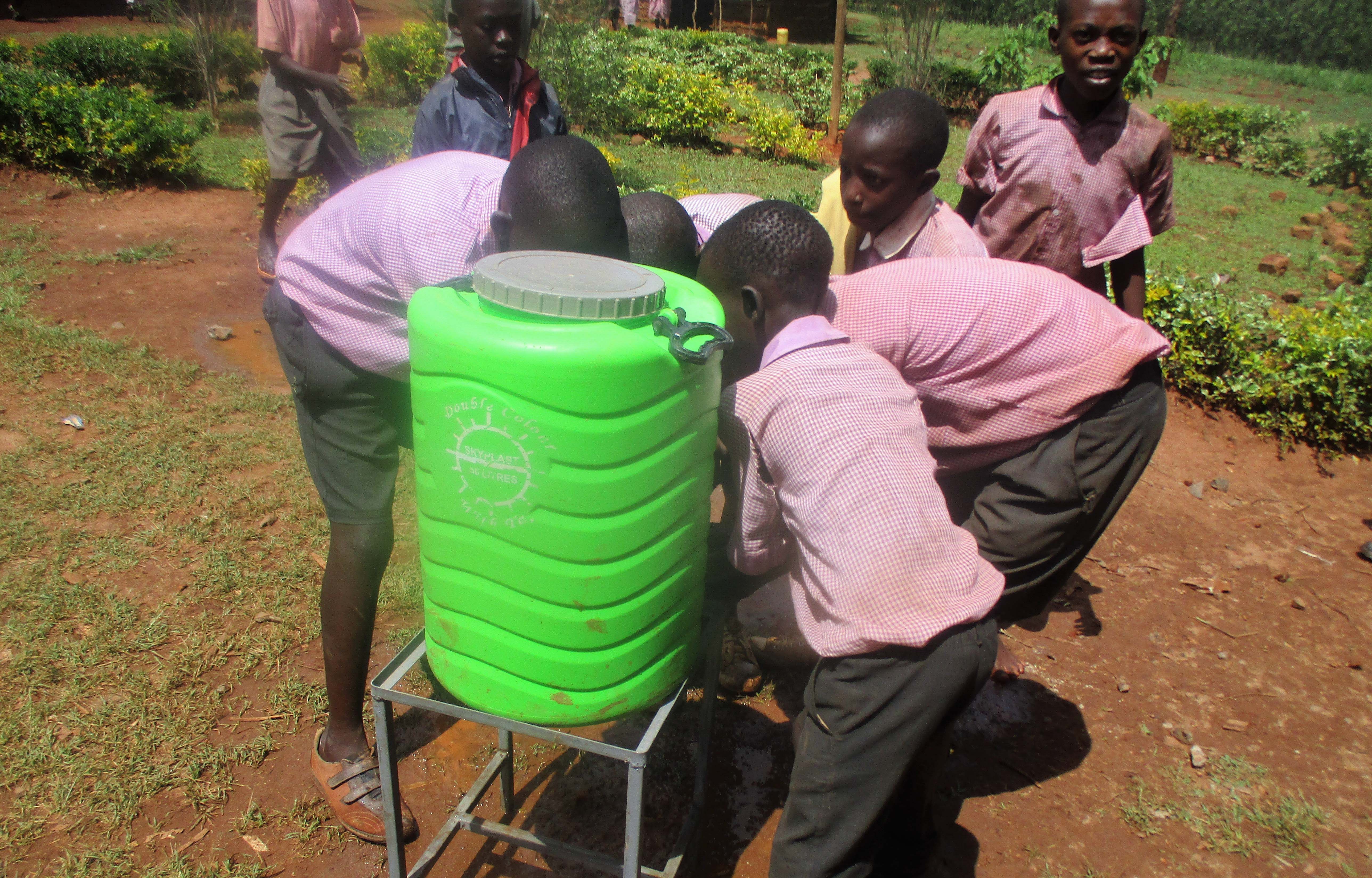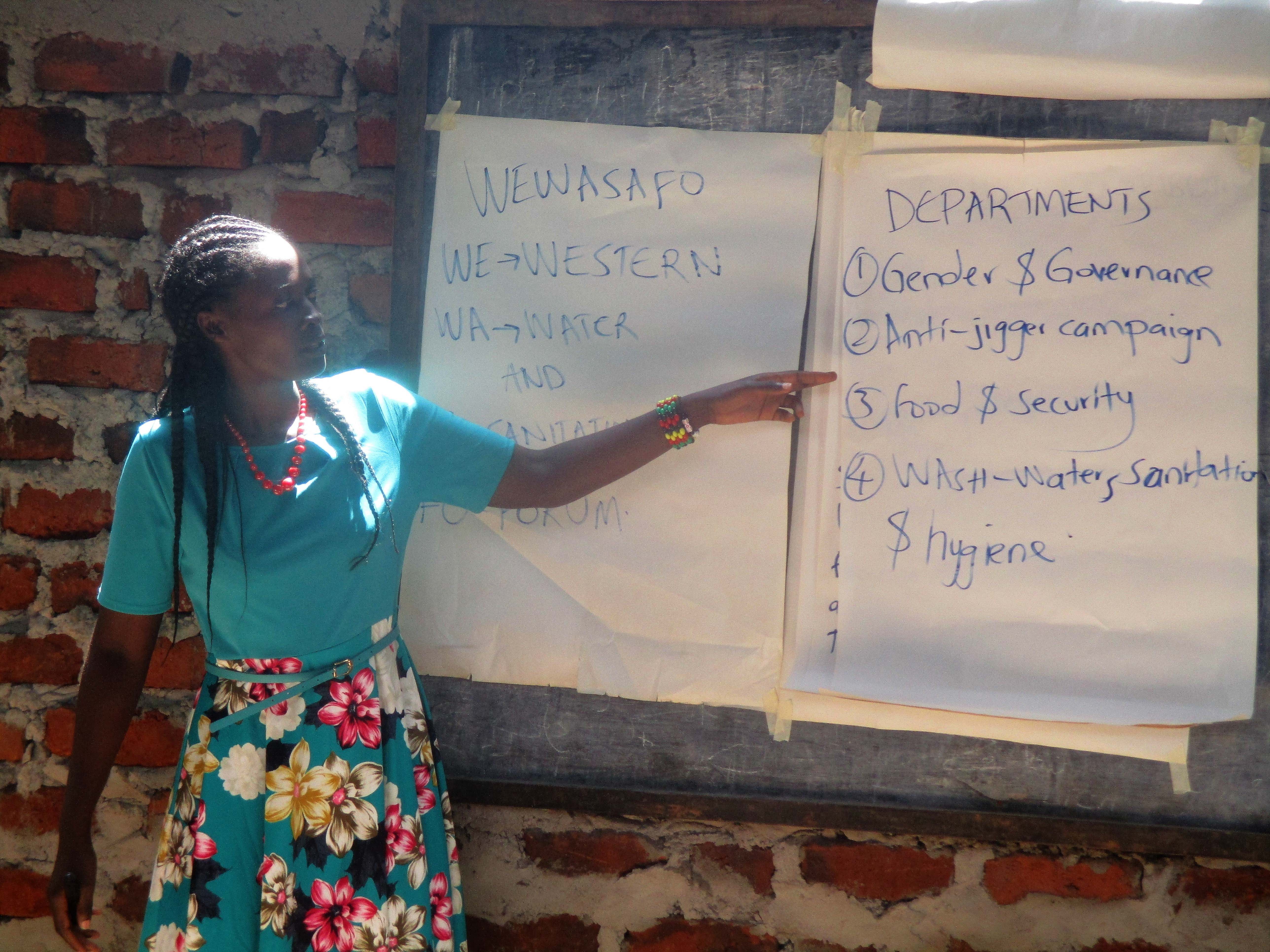This project is a part of our shared program with Western Water And Sanitation Forum (WEWASAFO). Our team is pleased to directly share the below report (edited for clarity, as needed).
Welcome to the School
The normal day differs depending on who you are. For example, Mr. Lawrence Obege, the headteacher of Lwangele Primary spends much of his day enduring the noise coming from class one kids whose classroom is home to his office. He says that each day he looks forward to attending to the needs of visitors, parents and pupils. He also likes to teach at least one lesson a day.
The pupils spend time in class, play during break times, and fetch water from the stream in Lwangele. Most parents are peasant farmers, planting maize which barely provides the twenty Kenyan shillings to pay education fees.
Water Situation
There is no water source on school grounds. These small students are sent out to fetch water from a stream in Lwangele. This stream's water is open to contamination from many different sources. Community members even bathe in this water!
Students bring their small plastic containers back to school and pour them in the LifeStraw dispensers they have. Some of these are filled with water intended for drinking, while others are used as hand-washing stations. The health teacher in charge of the LifeStraw gadgets says that most children have reported stomachaches time and again after they drink water from these. The teacher says that the filters are obviously failing, and her students are just drinking raw contaminated water from the stream.
Sanitation Situation
The community is experiencing sanitation issues because of a shortages of facilities. Open defecation is a reality here. Only 40% of the households surrounding Lwangele Primary School have latrines! The rest must seek the privacy found behind bushes and buildings.
There are latrines at the school, but they are in a terrible state. The pits are so full that one can barely squat to use them.
These conditions only describe a small portion of the poverty ravaging this community, which is also plagued with serious cases of jiggers. These painful parasites are spread among school students because of poor sanitation and hygiene standards.
Deputy Headteacher Ogudah Edward told us the "majority of the pupils are infested with jiggers, but due to low self esteem and fear of being stigmatized, they are ready to open up and share their story. A neighbor to the school, Mrs. Beatrice Lumadi, is handling a case of her grandchild, Ian, who has been rendered immobile because of jiggers infestation and associated opportunistic diseases such as malnutrition. A majority of the villagers also fall victim of water shortages, they draw their drinking water from Lwangele stream and use it, sometimes without any form of treatment nor boiling it."
Plans: Hygiene and Sanitation Training and Hand-Washing Stations
Training will be held for two days. The facilitator will use PHAST (participatory hygiene and sanitation transformation), ABCD (asset-based community development), CTC (child to child), lectures, group discussions, and handouts to teach health topics and ways to promote good practices within the school. The CTC method will prepare students to lead other students into healthy habits, as well as kickstart a CTC club for the school. This CTC club will oversee the new facilities, such as hand-washing stations, and make sure they are kept clean and in working condition. The two hand-washing stations will be delivered to the school, and the club will fill them with water on a daily basis and make sure there is always a cleaning agent such as soap or ash.
(Editor's Note: We're happy to share that government support will allow our partner to treat the cases of jiggers ravaging Lwangele Primary School, too!)
Plans: Rainwater Catchment Tank
A 50,000-liter rainwater catchment tank will be constructed on school grounds. Teachers, students, and parents will gather the materials needed for this project, including sand, ballast, bricks, and hardcore. This contribution will fuel a sense of responsibility for the school and community to take care of their new facilities. Once materials are mobilized, the WEWASAFO team will arrive to lead the construction effort.
This water will be treated with chlorine and rock alum as the tank fills during the rainy season. With adequate clean water, the school will have enough water for drinking, cooking, cleaning, and hand-washing. Most importantly, students will no longer be sent to the stream to fetch water throughout the day! This time will be devoted to studies.
Plans: VIP Latrines
Two triple-door latrines will be constructed, providing three new latrines for each gender. Latrine materials will be mobilized the same way as the tank, ensuring the school feels these facilities are truly theirs. And with a rainwater catchment tank nearby, there will be enough water to keep them clean.
School administration and parents are positive that with these new facilities and training, their students’ academic performance will improve. Students will be healthy and empowered to focus on what’s important!

 Rainwater Catchment
Rainwater Catchment
 Rehabilitation Project
Rehabilitation Project


































